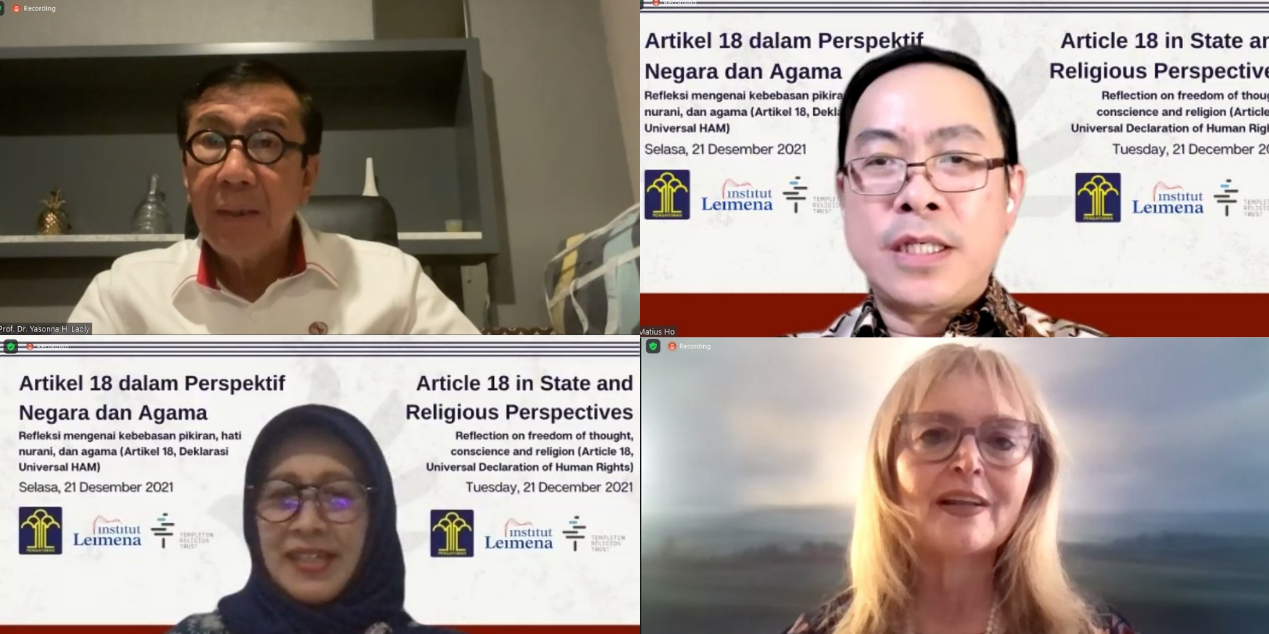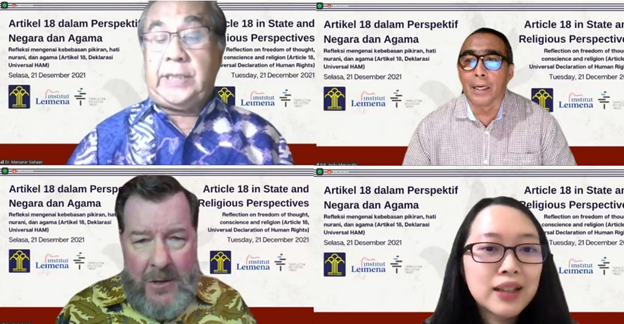
Minister of Law and Human Rights of the Republic Indonesia, Prof. Dr. Yasonna H Laoly (top left), Leimena Institute’s Executive Director (top right), Professor of Human Rights and Gender at Sunan Kalijaga State Islamic University, Prof. Dr. Siti Ruhaini Dzuhayatin (bottom left), and President of the Lantos Foundation for Human Rights Dr. Katrina Lantos Swett (bottom right).
IL News 002/2022
Jakarta, March 5, 2022 – The Minister of Law and Human Rights of the Republic Indonesia, Prof. Dr. Yasonna H Laoly, stated that religious freedom in Indonesia is still facing many challenges. One of them is the violence against certain religious minority groups.
“One of the problems that has recently emerged is violence against adherents of a minority sect of a religion, which is seen by the majority sect as having deviated from the teachings of that religious principle,” Yasonna said in his keynote address at the international webinar “Article 18 of the Universal Declaration of Human Rights from the Perspective of State and Religion” which was initiated by the Indonesian Ministry of Law and Human Rights and Leimena Institute in the context of the 73rd International Human Rights Day, Tuesday (21/12/2021) night.
The Minister of Law and Human Rights emphasized that the right to religious freedom must be recognized as a human right as stated in article 18 of the Universal Declaration of Human Rights. This recognition requires that the state cannot prohibit any religion or sect to enter and develop in Indonesia, as long as it is in accordance with the principle of “Belief in One and Only God” and does not offend the principles and beliefs of other religious communities.
“With the existence of violence against religious minority groups, the responsibilities of the state to be present, to provide protection for, [and] to uphold the dignity of its citizens, including people from minority groups cannot be understated,” Yasonna said to more than 1,000 webinar attendees from within the country and abroad.
Data from the Ministry of Law and Human Rights throughout 2021 recorded 13 incidents of alleged human rights violations obtained from 21 public complaints. Among them the issuance of a decision of the Indonesian Ulema Council (MUI) Muaro Jambi which considered Darut Tauhid’s teachings heretical, a joint ministerial decree limiting the teachings of Hare Krisna and Iskcon because they were considered heretical, a polemic on the construction of a church in Sukoharjo, Central Java, a mandate forcing the use of Muslim clothing in schools in Padang, West Sumatra, the cessation of the construction of Ahmadiyya places of worship in Garut Regency, West Java, the rejection of the construction of a Muhammadiyah mosque by Nahdlatul Ulama (NU) members in Banyuwangi, East Java, and a polemic of the establishment of a church in Aceh Singkil Regency.
The Minister of Law and Human Rights, who was accompanied by the Director of Public Communication Services of the Ministry of Law and Human Rights, Dr. Pagar Butar Butar, mentioned that, in general, the life of religious freedom in Indonesia is progressing, in terms of constitutional law and protection of the right to religious freedom compared to other countries. However, this progress raises more complex problems, especially with the expansion of the freedom of speech.
“For example, groups that previously did not dare to speak, are now starting to appear in public to express their opinions, which have positive and negative impacts,” said Yasonna.
The Minister of Law and Human Rights stated that religious freedom is also guaranteed in the Indonesian Constitution even far before the proclamation of the Universal Declaration of Human Rights on December 10, 1948, for example article 28E paragraph (1) and article 29 paragraph (2) of the 1945 Constitution. Religious freedom as a human right is classified as a non-derogable right, meaning that in the human rights treaty it is a right whose fulfillment cannot be suspended by the state in any situation and condition, including a state of emergency, such as a civil war or a military invasion.
“Non-derogable rights are seen as the most important human rights. Non-derogable rights must be implemented and must be respected by the state under any circumstances and in any situation,” Yasonna emphasized.

Leimena Institute’s Senior Fellow and Former Constitutional Court’s Judge, Dr. Maruarar Siahaan (top left), General Secretary of the Communion of Churches in Indonesia, Rev. Jacky Manuputty (top right), Senior Fellow at the University of Washington, Dr Chris Seiple (bottom left), and moderator Viona Wijaya (bottom right).
The Example of Johannes Leimena
Leimena Institute’s Executive Director, Matius Ho, said that state authority is often contradicted with religious authority in public life. While in fact, the two go hand in hand, as Dr. Johannes Leimena showed that the role of a responsible citizen and a true nationalist is a reflection of love, loyalty, and obedience to God.
“This pluralistic Indonesia was born from such founding figures of the nation’s, who always tried to find common ground between state and religious perspectives, as well as between diverse beliefs,” said Matius.
Leimena Institute’s Senior Fellow and Former Constitutional Court’s Judge, Dr. Maruarar Siahaan, mentioned that this webinar is part of a series of cross-cultural religious literacy education to strengthen Pancasila as the foundation of state and philosophical thinking for state life as well as the source of all legal sources.
Professor of Human Rights and Gender at Sunan Kalijaga State Islamic University, Prof. Dr. Siti Ruhaini Dzuhayatin, said Indonesia should be grateful because Indonesia’s nation building process was well established before the state building process commenced. In that context, religion became part of the nation building process which was agreed upon through the Youth Pledge of October 28, 1928.
“Indonesia has a blessing, an extraordinary gift, because since the beginning, religion has been part of the nation building that is civil in nature. This is a civil autonomy and authority in managing religion,” said Prof. Siti, who is also the Senior Advisor to the Indonesian President’s Executive Office.
Siti explained that Indonesia is different from other Islamic countries, such as Afghanistan that is facing difficulties in building reconciliation because the formation of the state precedes the formation of the nation, resulting in high ethnoreligious sentiments. Efforts by parties who want to give all aspects of religion over to the state must be restrained because it will result in a a dominant and authoritarian state that might endanger religious minorities or sects.
“The state’s responsibilities should be limited to protecting against religion-based violence and regulating religious matters related to public governance such as marriage, divorce, worship in Islam, namely Hajj, but not regulating a specific type of pilgrimage, prayer or religion,” Siti pointed out.
President of the Lantos Foundation for Human Rights, Dr. Katrina Lantos Swett, remarked that history proves that nations built on the foundation of respect for fundamental human rights and freedom of religion, thought, conscience, tend to be more successful in actualizing the goals of their societies. Katrina is the daughter of a Hungarian Holocaust survivor who survived one of the dark chapters of humanity and was able to start a new life in the United States.
“In 1980, my father was the first and only Holocaust survivor in U.S. history to ever serve in the U.S. Congress. His horrifying experiences led him to establish the Congressional Human Rights Caucus, which eventually became the Tom Lantos Human Rights Commission of the U.S. Congress,” Katrina said.
A Senior Fellow at the University of Washington, Dr Chris Seiple, said that human rights issues begin in spaces most proximate to us. Everyone can get involved in upholding human rights by learning and practicing personal, comparative, and collaborative competencies.
General Secretary of the Communion of Churches in Indonesia, Rev. Jacky Manuputty, said that the state’s firmness on human rights is still highly influenced by the wide acceptance of the public opinion of the majority as truth and valuing placidity and tranquility in lieu of upholding certain human rights. (IL/Chr)
